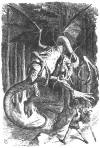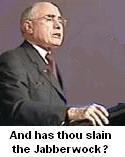|
Editorial-23 July 2003 |
|
Beware the Jabberwock My Son! The Jaws that Bite... |
While Humpty
Dumpty went to considerable effort to explain to Alice the meaning of the first
(and final)
stanza of Lewis
Carroll's Jabberwocky, there he let the matter rest, so there is little
guidance regarding the definitions and meanings of the intermediate five
quatrains. As Charles Dodgson Carroll had a day job as an Oxford
mathematician. And if the enabling sciences had been having as bad a time in the
England of the 1870's as they are now in Australia, perhaps he may have written
Jabberwocky as an allegorical struggle against academic annihilation, if
not it may now serve the purpose.
final)
stanza of Lewis
Carroll's Jabberwocky, there he let the matter rest, so there is little
guidance regarding the definitions and meanings of the intermediate five
quatrains. As Charles Dodgson Carroll had a day job as an Oxford
mathematician. And if the enabling sciences had been having as bad a time in the
England of the 1870's as they are now in Australia, perhaps he may have written
Jabberwocky as an allegorical struggle against academic annihilation, if
not it may now serve the purpose.
"Beware the Jabberwock, my son!
The jaws that bite, the claws that catch!
Beware the Jubjub bird, and shun
The frumious Bandersnatch!"
Is that how the current Minister for Education, Science and Training views the higher education sector?
"When you become a Cabinet Minister, the Prime Minister writes you ... a Charter Letter. It sets out the Prime Minister's expectations of what you will do and what will be the priorities for you in your portfolio. [I]n relation to Universities, [it] said that I should understand and enunciate the importance of higher education to the Australian community, and I should continue to progress workplace relations reform in the sector."
[Brendan Nelson, Chalmers Oration, Flinders Medical Centre, Adelaide July 17, 2003]
He took his vorpal sword in hand:
Long time the manxome foe he sought --
So rested he by the Tumtum tree,
And stood awhile in thought.
"Within three weeks of being in the portfolio there were a number of things that were clear to me. The first is, that those of you who argue from the higher education sector that there is a crisis, can I just say to you, please desist at that kind of language? And the reason I say that is because there are Australians who are living in parts of this country where entire industries are disappearing, who at times have neither the skills nor indeed the level of education which enables them to deal with that easily.
" If you want to see a crisis, have a look at school attendance by Aboriginal Australians in Arnhem Land: 25-54%. If you want to see a crisis in education, consider that only 16 of 378 Aboriginal children outside of Darwin and Alice Springs can pass a basic year 3 reading test."
[Brendan Nelson to the Australian Academy of Science. May 2, 2002]
And, as in uffish thought he stood,
The Jabberwock, with eyes of flame,
Came whiffling through the tulgey wood,
And burbled as it came!
"When I came into the job I was told about the crisis in universities. I looked back through the National Archives – there’s been a report on the crisis in Australian higher education, published in 1952, 1965, 1970, 1980, 1994 and 2001. The overall position of the sector is sound, currently. $20.8 billion in fixed assets, $4.8 billion in liquid assets. A operating position of $430M, a 34% improvement on year 2000. Borrowings in the sector $591M, which is 2.9% of asset value. When you look at broad terms, across the sector, you wouldn’t describe it as a crisis. As I said to those who were saying, oh the sector’s in crisis, I said "Oh OK". I said "if you want to see a crisis in education, just have a little look at Aboriginal literacy outcomes in the Pilbara, the Kimberley, the Cape, the Northern Territory."
[Brendan Nelson, Chalmers Oration, Flinders Medical Centre, Adelaide July 17, 2003]
One, two! One, two! And through and through
The vorpal blade went snicker-snack!
He left it dead, and with its head
He went galumphing back.
"I said to the Academy of Science on Thursday night, whilst I understand that people in the sector speak of a crisis, of crises, I just repeat again, the university sector has $20 billion of fixed assets available to it, $4.4 billion in liquid assets, $10.4 billion in revenues this year - almost $2 billion increase over the past 5 years. ... If you want to talk about a crisis, I would suggest that for a start, where only a quarter of Aboriginal Australians in some parts of Arnhem Land attend school, I put that in the crisis category. When only 16 of 378 Aboriginal kids outside Darwin or Alice Springs can pass a basic year 3 reading test, I put that in the crisis category."
[Brendan Nelson to the Nationsl PressClub, May 8, 2002]
"And, has thou slain the Jabberwock?
Come to my arms, my beamish boy!
O frabjous day! Callooh! Callay!"
He chortled in his joy.
"[I]n relation to Universities, [the Prime Minister's] letter said that I should understand and enunciate the importance of higher education to the Australian community, and I should continue to progress workplace relations reform in the sector."
[Brendan Nelson, Chalmers Oration, Flinders Medical Centre, Adelaide July 17, 2003]
It is
remarkable that Government ministers, Dr. Nelson being a prime example, almost
always quote figures showing an increase in dollars spent. They rarely factor in
inflation. They do not give the per-cent of the government's income (mostly tax
generated) allocated, they do not relate it to the nation's per capita GDP, they
do not compare with the efforts of the best performing nations. And they do not
list the relative percentage
On July 20, 2001 the then Minister for Education Training and Youth Affairs, Dr. David Kemp wrote the Vice-Chancellor of the Australian National University, and then President of the Australian Vice-Chancellor's Committee, Professor Ian Chubb, taking issue with a comment he made to the Senate Committee on July 17th:
"When asked by Senator Kim Carr... whether you believed the universities were in crisis you answered 'Yes'. My concern arises from two sources. One is that the assessment is patently incorrect... Secondly, the AVCC's assertion has a very real potential to damage the standing of Australian universities both domestically and internationally."
In a studied reply Professor Chubb gives details to support his statement to the Committee opening with, "I was asked at the Senate hearings whether the higher education SYSTEM was in crisis - not whether each and every university was in crisis. I answered 'yes' after explaining that it was not a word that I used often but that I couldn't 'easily think of another'..." Prof. Chubb continued, " [On August 13th]Mr. Gallagher [Michael Gallagher, First Assistant Secretary, Higher Education Division, Department of Education, Training and Youth Affairs, Dr. Kemp's Department] suggested to the same Senate Committee that Vice-Chancellors who said such things were simply 'looking for an easy way out' and not facing up to their 'management responsibilities.'" Professor Chubb then asks the rhetorical question, "Why would I answer that way?" and proceeds to list the reasons in the course of which he cites statements made by Senator Robert Hill (Lib) who refers to "the funding crisis in higher education and the deteriorating quality of education in this country as a result" and Dr. Kemp, "[I]t is quite clear... the research infrastructure with which [post graduate students] have to deal is in crisis". Professor Chubb also points out that Dr. Kemp quotes Prof. Alan Gilbert (now V-C, University of Melbourne) that the best Australian University might just make it into the world top 50. Gilbert has recently revised his estimate to the top 75 or top 100.
Professor Chubb concludes his rebuttal, "I leave you to draw your conclusions."
As TFW observed in March, 2001 it's just a matter of how [and apparently when] you define crisis.
Time but little else has gone forward.
Alex Reisner
The Funneled Web
